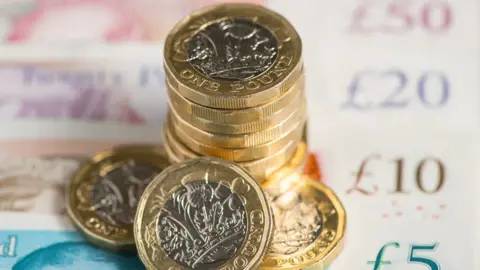Pound hits highest level since before mini-budget
 PA Media
PA MediaThe pound has hit its highest level since mid-September, as investors welcomed the appointment of Rishi Sunak as prime minister and the dollar fell.
Sterling surged by 1.9% to $1.149 on Tuesday - the highest it has been since before Liz Truss's mini-budget.
Government borrowing costs also fell back to where they were last month, in a boost for Mr Sunak who took over on Tuesday.
Financial markets have been rattled by fears over the economy in recent weeks.
In a speech today Mr Sunak warned the country faced a "profound economic crisis" with "difficult decisions" ahead.
Experts said the pound's strength was partly a "relief rally" after Mr Sunak was appointed, but also due to the dollar's weakness.
The US currency dropped on Tuesday after data showed slowing US house price growth and a decline in US consumer confidence.
"The dollar is losing ground across the board today," said Jeremy Stretch, head of FX Strategy at investment bank CIBC.
"But there's no doubt there's a relief rally here in terms of apparent stability in the macro-economic picture after Sunak came in."
Last month, sterling plunged to a record low against the dollar and government borrowing costs rose sharply in the aftermath of former Prime Minister Liz Truss's mini-budget.
Investors were spooked after then-Chancellor Kwasi Kwarteng promised major tax cuts without saying how they would be paid for - something Mr Sunak warned about during this summer's Tory leadership contest.
Mr Sunak, a former hedge fund manager, is seen as a safer pair of hands by investors and has pledged to fix "mistakes" made under Liz Truss's leadership.
New Chancellor Jeremy Hunt - who reversed almost all of Ms Truss's tax cuts - will keep his job in the new cabinet and is scheduled to set out his economic plan for tax and spending on 31 October.
On Monday Shevaun Haviland, director general of the British Chambers of Commerce, cautioned that the country "cannot afford to see any more flip-flopping on policies".
"The political and economic uncertainty of the past few months has been hugely damaging to British business confidence and must now come to an end," she said.
Borrowing costs fall
On Tuesday government borrowing costs fell back to levels seen just before the mini-budget, with the interest rate - or yield - on bonds due to be repaid in 30 years' time dropping to 3.6%.
Meanwhile, the yield on bonds due to be repaid in five years' time, which underpins the cost of new five-year fixed rate mortgages, fell to 3.7%.
Yields are still well above rates seen this summer but the fall will come as a relief to the government, whose September borrowing figures were the second highest on record.
Mortgage-holders will also hope it feeds through to the mortgage market, where rates hit 14-year highs after the recent turmoil.
On Monday, the deputy governor for markets and banking at the Bank of England, Sir Dave Ramsden, said recent falls in government borrowing costs had shown that "credibility is returning to British economic policy".
Yet despite the improving picture, experts warned Mr Sunak faced tough times ahead.
"The former chancellor has a mammoth task ahead of him as he tackles the mounting economic crisis facing the UK and his warring political party," said CityIndex strategist Fiona Cincotta.
Jordan Rochester, a strategist at Nomura, said every new leader tended to get a "honeymoon period".
"Liz Truss's didn't last very long. The question will be how long does this honeymoon period last for Rishi Sunak?"
